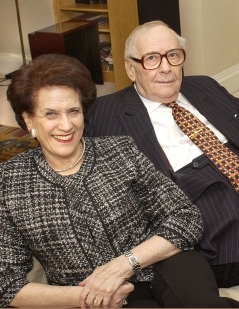Peter Gelb was at the ROH Forza matinee today, trying to cadge a word with the elusive Jonas.
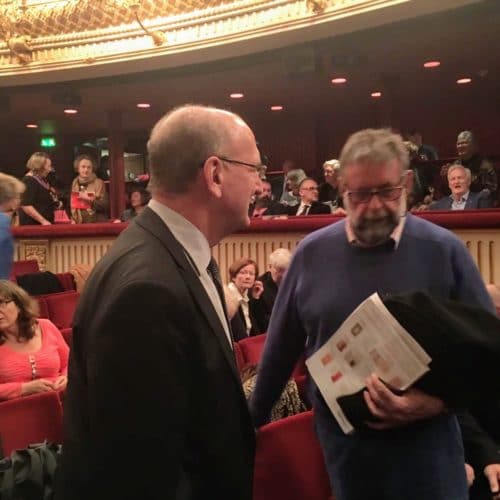
Photo by Slippedisc reader
Maybe he was just dropping off a silver baby rattle from Tiffany’s.
Peter Gelb was at the ROH Forza matinee today, trying to cadge a word with the elusive Jonas.

Photo by Slippedisc reader
Maybe he was just dropping off a silver baby rattle from Tiffany’s.
The Birmingham music director Mirga Gražinytė-Tyla has given her first interview about juggling life as an in-demand conductor with having a small baby who needs her.
She tells Fiona Maddocks in the Observer today that she has cancelled the next two years’ worth of guest conducting:
“Coming back so quickly was harder than I had anticipated. It was all a very sharp learning curve, and of course continues to be. It’s a new situation of dividing your concentration, finding the balance. In this growing emancipation there’s been an emphasis on women proving they could go on exactly as before. I think now we are entering another period. We have to admit that everything changes: mind, body, life. Of course you can do many things you could before but it’s a huge change, and it’s dishonest to pretend otherwise.”
Her players have grown accustomed to seeing the baby at the back of the hall in rehearsals, reportedly an acute and dedicated listener already, tended variously by Mirga’s partner, parents, younger siblings, a nanny. “He’s never far from me! There is an expression: ‘until the kid grows up you need a full farm’. In modern society, living in big cities, we don’t have big families nearby in many cases. I am lucky to have all this different support but it will take some working out….”
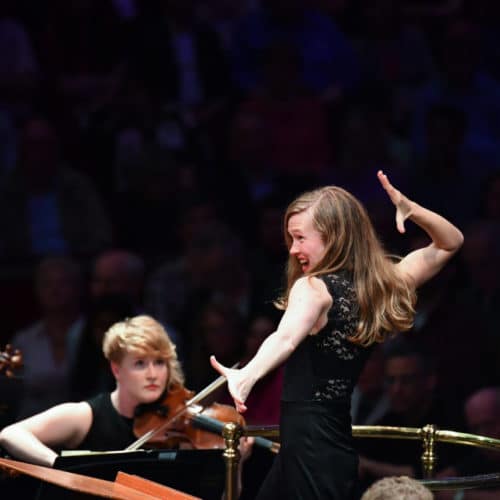
Read on here.
Iván Fischer pulled out of yesterday’s all-Bartók concert in Budapest with the Budapest Festival Orch.
His replacement was Gábor Káli, winner of the 2018 Nestlé-Salzburg Festival Conducting Competition.
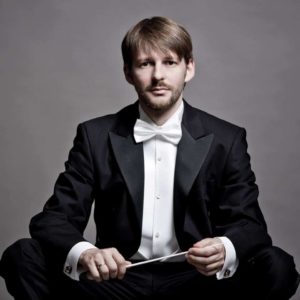
There are two massive innovations at the Carl Nielsen competition, which opened this weekend in Odense, Denmark.
The first is that its president Nikolaj Szeps-Znaider has banned professors and teachers from the violin competition jury.
Just like that. No more you vote for my student, I’ll vote for yours.
No more I’ll double my private fees when my student wins.
The bracing air of Odense feels extraordinarily clean.
Second, the jury in the violin contest are placed behind a black screen. They can hear the contestants in the first round but not see them.
That eliminates any aspect of favouring the fanciable ones. Players are judged on the music alone.
From what I was able to observe, the effect has been entirely positive. The jury has no idea who is playing and in which order. In the second round, the contestant appear in a different sequence.
Judges were playing a game guessing which was male and which female. Amazingly, they guessed right in every case they ran past me. Three judges who are concertmasters- Albena Danailova (Vienna Phil), Nurit Bar-Josef (National Symphony Orch) and Eugen Tichindeleanu (Odense Symphony) – were used to blind auditions. For the others, it was a testing first time.
As for the range of talent, it was very broad. I heard three absolute stand-out violinists. Watch this space.
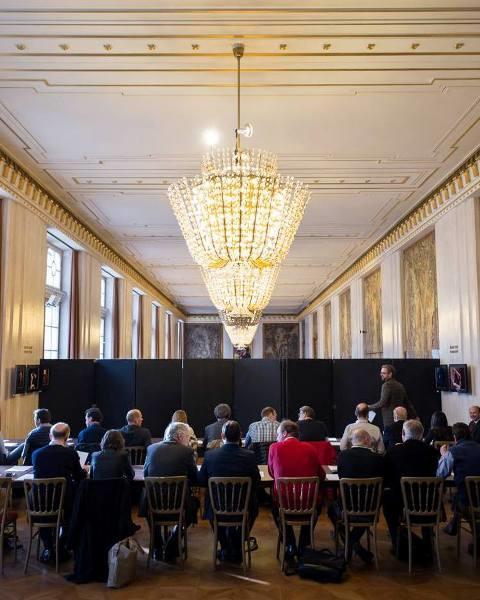
In future, all competitions need to be like this: teacher-free, blind and fair.
photo: Vienna Philharmonic audition, 2014
Our third and final extract from the new book by ex-LSO leader John Georgiadis:
A great admiration for the many fine LP’s made by George Szell with his Cleveland orchestra, meant a high level of excitement when it was announced that he would make one of his rare trips outside the USA to be guest conductor with the LSO. Our first surprise was his small stature, although we shouldn’t have been, as so many of his most celebrated colleagues of the baton-wielding variety were also much smaller than publicity photos would have you believe. However, seeing this diminutive figure climb onto a quite high podium – now we understood why the platform was double its usual height – was far outweighed by the astonishment I experienced when, from my front seat position, I could see clearly his knees shaking inside his trousers. Could this be true? Was this great Maestro, with that famous reputation for ruling with an iron fist, really frightened of us? It would appear so!….
….After passing through a few of the introductory bars that the orchestra had played faultlessly, where he couldn’t easily find anything to correct, the first notes played by the harpist gave Szell just what he was looking for. He stopped the orchestra, looked in the direction of the gentleman wrapped around that angelic instrument, and said, “Sir, your instrument is not in tune, kindly adjust it”. No big deal, for even though this was not our regular harpist, he was a very competent and much respected player. There was a short period while the orchestra sat quietly, listening to the necessary twanging of strings and clanging of tuning key, and then a few seconds of silence which suggested he was ready to proceed.
Szell re-started, but once again stopped the orchestra at the same point. “Your instrument is still not in tune, kindly attend to it”, said the Maestro, only now a little more forceful. And so came the clanging and twanging once again, but this time definitely a bit longer and louder with a distinct element of defiance, as our colleague was starting to suspect a personal attack. We also, were beginning to wonder…….! After all, to pick on a harpist…… It’s like taking sweets from a child…..
….The third attempt to play the offending passage ensued but with a similar result. “I tell you once again, your instrument is not in tune and it is not possible to work with it in that condition.” After a moment’s silence came the quite aggressive response, “How would you like it Dr. Szell, sharper or flatter?” spoken with no small amount of belligerence. Our harpist colleague had no doubt decided that enough was enough and it was time to put a stop to this obvious victimisation.
What followed was an extremely brief monologue from the Maestro in which he intimated with great clarity that he didn’t want it sharper or flatter, or more to the point, he didn’t want it at all with that particular harpist…..
….So within the space of his first 10 minutes as a guest conductor, George Szell had fired the harpist. The result of this very unusual happening was that this little man on the box was suddenly not so small and his knees, or for that matter his baton, were definitely no longer shaking, whereas many of us sitting around him were feeling more than a little wobbliness around the mid-leg region!
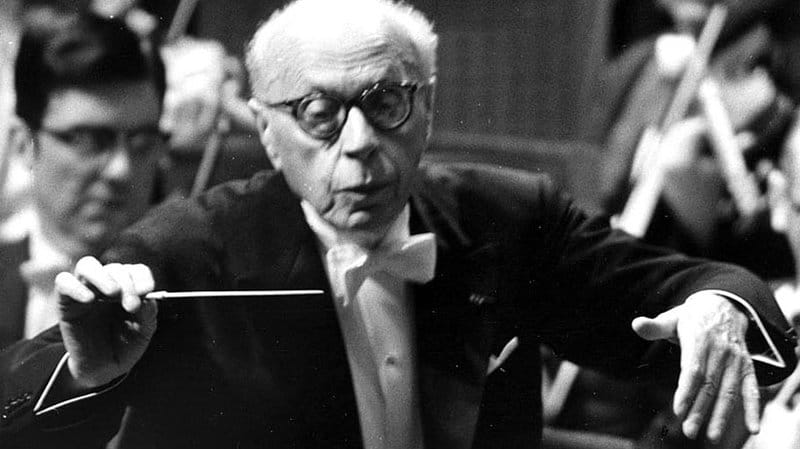
Our new book club discussion is about three central books about the composer and a new recording:
Julian Barnes: The Noise of Time
Elisabeth Wilson: Shostakovich, A Life Remembered
Solomon Volkov: Testimony
Artemis Quartet: Shostakovich (Erato)
Book Club moderator Anthea Kreston introduces the topic with four major authorities (below). Any questions? Ask them in the comments section below. Here’s Anthea:
Shostakovich – the man, the music, the world he inhabited. These are the themes investigated in this series of Fortnightly Music Book Club. Our selected materials – three books and one cd – are merely jumping-off points for our imaginations. We have a veritable army of people at the stand-by, ready for your questions and observations, each person bringing with them a world of experience to share with us. So grab your books, turn on the stereo, pour yourself a drink and put your slippers on. Let’s travel back in time, and find a path through the complex, devastating and wondrous world of Shostakovich.
Our guests are people both new and old to me. Ignat Solzhenitsyn (conductor and pianist), Elisabeth Wilson (author), Bernd Feuchtner (author and president of the German Shostakovich Society), Elisabeth Leonskaja (pianist), and Elisabeth von Leliwa (musicologist and vice-president of the German Shostakovich Society). Each is a monster of their chosen field, and we at Slipped Disk are honored that they have agreed to join us on this journey.
Materials read/listened to:
Julian Barnes: The Noise of Time
Elisabeth Wilson: Shostakovich, A Life Remembered
Solomon Volkov: Testimony
Artemis Quartet: Shostakovich (Erato)
Questions (general or for a specific person) can be left below in comments, or sent to Fortnightlymusicbookclub@gmail.com. Following are a collection of the biographies of our fascinating panel. What a ride this will be!
Elisabeth Wilson, Author of Shostakovich: A Life Remembered
“Dear Reader,
Anthea Kreston asked me to write a few words about how I came to write my book Shostakovich- A Life Remembered. Around 1986/87 I was approached by Faber and Faber to do a book in their series Composers Remembered. I am a cellist, and had studied in Soviet Russia at the Moscow Conservatoire during the mid 1960s to early 1970s under Mstislav Rostropovich. Altogether I lived in Moscow for 6 years. So I knew Russian very well, and had excellent musical contacts. This was perhaps a good qualification for me to do the book. On the minus side – I had never written anything in my life except an odd programme note- and I was unsure whether I could write at all. I nevertheless agreed to take on the commission, thinking I could construct the book around interviews with people connected with Shostakovich. This way it would fit into the Faber series.
I made several trips to Moscow and Leningrad (as it still was) in the last 4 years of the 1980s and started a fascinating adventure. Having been a student of Rostropovich’s (then living in exile), and through knowing the Shostakovich family I had the best qualifications to make contact with a large spectrum of people. These included Shostakovich’s sister, Zoya Dmitrievna and his first girlfriend, Tatyana Glivenko, and other family members, who in certain cases were willing to ”speak” but not to be interviewed. I interviewed many composers, musicologists and performers, and also the theatre director Yuri Lyubimov, the opera director Boris Pokrovsky and performers like Mstislav Rostropovich, Gennadi Rozhdestvensky, Valentin Berlinsky and Fyodor Druzhinin who had worked closely with Shostakovich. I talked to his best friend Isaak Glikman, and to people the composer studied with in Leningrad, such as Mikhail Druskin and Natan Perelman. I also met people, amongst them was Miecizlaw Weinberg, who were too frightened of speaking with foreigners. Weinberg didn’t say more than “Shostakovich was a wonderful composer and person” – nice to hear, but not very useful for the book. We must remember that I was doing my research in what was still the Soviet Union, where people had for years learnt to keep silent, and only to speak to somebody openly if you trusted them 100%, and at that to be careful that you spoke without being overheard. Yet politically, things were beginning to crack up, and Gorbachyov’s reforms included “Glasnost” – the idea of speaking out and reviewing the past more critically.
Some of the people I met volunteered to write their own reminiscences- I am proud of the fact that I encouraged people like Flora Litvinova ,Tatyana Litvnova, Isaac Schwartz and Mark Lubotsky to do so. I was also able to use taped interview material provided by Kirill Kondrashin’s widow, and to use Evgeny Evtushenko’s recorded testimony on the Thirteenth Symphony. Some of my interviewees were extremely interesting but controversial, not least Lev Lebedinsky, a one time critic of Shostakovich when he belong to RAPM (the Russian association of Proletarian Musicians) in the late 1920s/early 1930s. However life brought many changes to both men, and for more than a decade in the 1950s and early1960s they enjoyed a close friendship. I became very fond of Lebedinksy and his wife, but knew I had to use his material with care.
In every case I did my best always to check people’s memories against published facts. I also took care to check that when I transcribed and wrote up the interview material, I then checked it out with the people concerned, giving them a chance to correct what I wrote, and to delete or add information.
I also met some people I had never heard of before, who had known Shostakovich in various capacities- as literary critics, as Jewish refugees during the War and so on. I heard many stories of how Shostakovich had helped people, often anonymously, and also how, when in his cups, he could pour sarcasm on those he thought were stupid or antagonistic; – these included Party officials.
For the most part what I was told only increased my respect for Shostakovich the man- I was already an immense admirer of his music from an early age. However there were also those who criticised Shostakovich’s actions, not least his “signing” letters or newspaper articles – or more precisely his not protesting when his signature was added without being asked. There were also some people who simply wanted to share gossip- but with the microphone off. My problem was to use my judgement and be discerning about what material was genuine and viable, and what was suspect and should not be included in my book.
The next stage of my work was collating and adding written reminiscences and other published material to my own collection of material. I realised that by now I had extended my brief to such an extent, that the book had to come out of the Composers Remembered series. In fact almost all of what I had now amassed was either completely new or had never before appeared in English. It was then that I agreed with my editor that I should construct a “mosaic” biography, using the interviews , written material and reminiscences (while attempting to exclude too much repetition). My job was to link the disparate parts of the mosaic to give it thematic relevance and chronology to build up an objective picture of the composer’s life. I hoped that by placing the original contributions within the “context” of the times, I could recreate the atmosphere, which formed the background to Shostakovich’s life and work. I wanted his life to become more comprehensible and real to my English-speaking readers.
My book first came out in 1994 under the title “Shostakovich A Life Remembered.” In 2006 I did a revised and expanded edition- this was necessary because of the enormous quantity of new material that emerged in Russia during the 1990s and early years of the new century. And of course I could still think of making a third edition as new material continues to appear, but at this stage I think it best to leave well enough alone. An enormous quantity of Shostakovich books and critical assessments of his music have come out in recent years. In particular the scholarly work being done in recent years Russia is highly commendable and has brought to light new works(mostly in-completed) and important insights.
But “unslanted” biographies are rather more scarce than you might think. I can highly recommend Laurel Fay’s biography to those interested in a detailed, factual account of his life. In Russia, a two volume biography written in the 1980s by Sofiya Khentova was a pioneering book in one sense, but unfortunately it was highly flawed by its heavily ideological slant. A real and viable Shostakovich biography by a Russian biographer or scholar has yet to appear.
Although I do not believe that Solomon Volkov’s Testimony can in any way claim to be “Shostakovich’s Memoirs”, his book was – and still is -a fascinating read. Credit is due to Testimony for perhaps being the first to open the eyes of many people in the West to what Shostakovich was and what he stood for. Again it is a flawed book because of its methods, and for making a false claims that it was all a dictated memoir, when in fact some of the material came from Soviet published sources- Volkov hoped nobody in the West would be aware of them. But it made Westerners realise that the “official” puppet version of the “ideal communist” composer was an invention of the Soviet State authorities. On the converse side it unwittingly gave rise to some very primitive interpretations of the music.
It is not for me to judge where my book stands in all this, but I hope I succeeded in showing Shostakovich in a fair and comprehensive way, where the legendary side of his achievements is balanced by facts. For me it was important that this extraordinary composer was seen and understood against the background of the times.”
Elizabeth Wilson ©
“Shostakovich A Life Remembered”
2006 Faber and Faber London
Princeton University Press.
Ignat Solzhenitsyn, Conductor and Pianist
Recognized as one of today’s most gifted artists, and enjoying an active career as both conductor and pianist, Ignat Solzhenitsyn’s lyrical and poignant interpretations have won him critical acclaim throughout the world.
In 2018-19 Mr. Solzhenitsyn returns to the St. Petersburg Philharmonic with Gidon Kremer as soloist, conducts a new production première of One Day in the Life of Ivan Denisovich at the Bolshoi Opera, appears as piano soloist with Vladimir Spivakov and the National Philharmonic of Russia, and gives solo recitals in New York, Zurich, and St. Petersburg.
Principal Guest Conductor of the Moscow Symphony Orchestra and Conductor Laureate of the Chamber Orchestra of Philadelphia, Ignat Solzhenitsyn is much in demand as a guest conductor, having recently led the symphonies of Baltimore, Buffalo, Cincinnati, Dallas, Indianapolis, Milwaukee, Nashville, Phoenix, Seattle, and Toronto, the Nordwestdeutsche Philharmonie, the Czech National Symphony, as well as many of the major orchestras in Russia including the Mariinsky Orchestra, the St. Petersburg Philharmonic, the Moscow Philharmonic, and the Moscow Symphony.
A winner of the Avery Fisher Career Grant, Ignat Solzhenitsyn serves on the faculty of the Curtis Institute of Music. He has been featured on many radio and television specials, including CBS Sunday Morning and ABC’s Nightline. Born in Moscow, Mr. Solzhenitsyn resides in New York City.
Bernd Feuchtner is living as freelance author in Berlin and is President of the German Shostakovich Society. For ten years, he served as Artistic Director and Chief Dramaturg in Heidelberg, Salzburg and Karlsruhe. Before that, he was one of the most renowned music and dance journalists, worked as editor at Der Tagesspiegel Berlin newspaper and Opernwelt magazine and contributed to Frankfurter Allgemeine Zeitung, Süddeutsche Zeitung and several Radio Stations. He lectured at Universities in Frankfurt, Berlin, Heidelberg, Salzburg and Karlsruhe.
Elisabeth Leonskaja, pianist
For decades now, Elisabeth Leonskaja has been among the most celebrated pianists of our time. In a world dominated by the media, Elisabeth Leonskaja has remained true to herself and to her music, and in doing so, is following in the footsteps of the great Russian musicians of the Soviet era, such as David Oistrakh, Sviatoslav Richter and Emil Gilels, who never wavered in their focus on the quintessence of music despite working in a very difficult political environment. Her almost legendary modesty still makes her somewhat media-shy today. Yet as soon as she walks out on the stage, audiences can sense the force behind the fact that music is and always has been her life’s work.
Born in Tbilisi, Georgia, to a Russian family, she was regarded as a child prodigy and gave her first concerts as early as age 11. Her exceptional talent soon brought her to study at the Moscow Conservatory.
While still a student at the Conservatory, she won prizes in the prestigious Enescu, Marguerite Long and Queen Elizabeth international piano competitions. Despite her busy schedule as a soloist, chamber music has always played a prominent role in her creative work, and she frequently appears with the Emerson, Borodin and Artemis Quartets.
Elisabeth von Leliwa, born 1962 in Berlin, is a musicologist and music manager.
She started her professional career working in the management of the Duesseldorf Symphony Orchestra (Deutsche Oper am Rhein). 1997 she became a member of the senior management of the Tonhalle Duesseldorf, one of the biggest concert halls in Germany. A main focus of her work has always been the music of the 20th and 21st centuries.
As a university lecturer, she teaches Musicology and Management for Musicians at the Robert Schumann Hochschule Duesseldorf.
She took a leading part in the project “On the Wings of Music – concert programs for people with dementia”, which was launched 2012 in North Rhine-Westphalia and received the “BKM-Preis Kulturelle Bildung” by the German Federal Government Commissioner for Culture and the Media. Since then, musical projects for persons with dementia have been an important part of her work. The experience of how music can affect memory, emotion and well-being has influenced and enriched her thinking as a teacher, coach and consultant.
Since September 2018, she is vice president of the German Shostakovich Society.
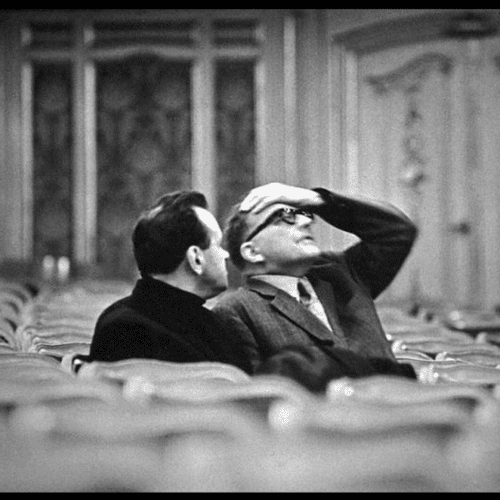
We are saddened to report the death of Victor Hochhauser, a central force in music for seven decades. Victor died yesterday in a London hospital, in the week of his 96th birthday.
Together with his wife Lilian, who survives him, Victor was the first to succeed in touring Soviet artists after the death death of Stalin. He introduced to the West the likes of Oistrakh, Rostropovich, Gilels, Richter, Rozhdestvensky and many more. Dmitri Shostakovich stayed at his house. Many of them remained close personal friends after the Soviets declared the Hochhausers personae non grata. The Bolshoi Ballet was for many years their hallmark import.
His second vital innovation was the institution of cheap popular weekend concerts at the Royal Albert Hall. For many people, this was their first experience of live classical music. For many young musicians, this was their first opportunity to earn a living.
Victor and Lilian were married for 70 years. Their four children have achieved outstanding success in different fields.
A devout and observant Jew, Victor stood apart from the rat-race of the music business, following his own rhythms and high principles. He earned the respect and affection of musicians as disparate as Rudolf Nureyev and Pierre Boulez and he was an inexhaustible fount of good stories.
We are all blessed by his initiatives.
